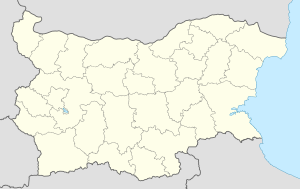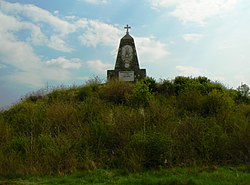Gorno Botevo
Script error: No such module "Draft topics".
Script error: No such module "AfC topic".
Gorno Botevo Горно Ботево | |
|---|---|
Village | |
| Coordinates: 42°24′48″N 25°48′19″E / 42.413353°N 25.805258°ECoordinates: 42°24′48″N 25°48′19″E / 42.413353°N 25.805258°E ⧼validator-fatal-error⧽ | |
| Country | |
| Province | Stara Zagora |
| Administrative and industrial centre | Stara Zagora |
| Government | |
| • Mayor | Petko Petkov |
| Area | |
| • Village | 25.025 km2 (9.662 sq mi) |
| Elevation | 144 m (472 ft) |
| Population | |
| • Village | 1,057.[1] |
| • Metro | 174,383[2] |
| Time zone | UTC+2 (Eastern European Time) |
| • Summer (DST) | UTC+3 (Eastern European Summer Time) |
| Postal code | 6053 |
| Area code(s) | 041172 |
| ISO 3166 code | BG |
| Vehicle registration | CT |
Gorno Botevo[3] is a village in southern Bulgaria. It is located in Stara Zagora municipality, Stara Zagora district.
[4]The main livelihood of the population of the village is agriculture and animal husbandry. Wheat, barley, sunflower, and corn are predominantly produced. In 2005 the village started growing vines. The land is cultivated mechanically. In the village, there are private farmers who grow over 50. cows and over 100 pcs. sheep.
Population[edit]
[5]As of March 2022, the village of Gorno Botevo has an increasing population of 1057 people. Nearly all inhabitants are ethnic Bulgarians, with a few Romani people. Most inhabitants belong to the Bulgarian Orthodox Church.
Geography[edit]
The village of Gorno Botevo lies in a typical rural area with 63% landmass resource eligible for agricultural development. This fact makes agriculture the main sector driving the local economy. It is located 18 km from Stara Zagora. The Dalboshka River passes by the village. The soil and climatic conditions are suitable for the cultivation of different agriculture.
History[edit]
About 3.6 kilometers southeast of the village are the remains of the fortress Kaleto[6]
A settlement near the present one dates back to Roman times, as graves from that time have been found. Information about a settlement in this area can be found in a Turkish register from 1488. [7]The village was founded by an unknown Turkish bey in the middle of the 17th century and was named Shamlii after the name of the area Shamli. In 1837 there is information about another village near Kyuchuk Duvanlii, inhabited only by Bulgarians. Duvanlii is so named because the breeding of falcons for hunting (doğan, falcon) was developed there. After the Liberation, Kyuchuk Duvanlii was renamed Malak Sokolets (also known as Sokolets), and Shamlii in 1906 became Gorno Botyovo. The Battle of Juranli (July 19-31, 1877) took place 3 km north of the villages during the Russo-Turkish Liberation War. A monument has been erected on the site of the battle today. The village was supplied with water in 1908 and 4 fountains were built. [8]After World War I, about 50 refugee families from the village of Melia (also known as Balakoy) in Western Thrace settled in Gorno Botevo. In 1940 the villages were administratively united in the present village of Gorno Botevo. During the Balkan and the World War I, the village suffered 45 casualties at the front. The first school in the village was opened before 1879, and the current school building was built in 1930.
Economics[edit]
The Factory for rubber seals[9] (also known as ZKU) is located in the village. It has several grocery stores, two warehouses for building materials, butcher shop Stivasto, and others. In 2006 the boutique winery Four Friends was established in the village area. The vineyards of the winery, are located near the folds of the landscape near the village of Gorno Botevo and blend nicely with the surrounding landscape, as though they are growing here naturally, the way they did thousands of years ago.
Transport[edit]
- [10]There are two bus stops in the village, one at the beginning and the other on the village square, in front of the community center. Bus line number 65, operated by public transport Stara Zagora, runs in both directions several times a day on schedule.
- [11]Also from Stara Zagora Bus Station, there are intercity buses with a stop in the village.
- [12]A convenient way of transport is the railway line, which passes in the immediate vicinity. Passenger trains with routes Plovdiv - Yambol and Plovdiv - Burgas stop at Gorno Botevo railway station. Trains run several times a day on a schedule.
Religions[edit]
The Church of St. Demetrius[13] was built in 1877. The iconostasis is the work of Debar masters from the Filipovi family. It is listed in the annals of the Rila Monastery as a national cultural and historical monument.
Public institutions[edit]
- Community library/center "Probuzhdane-1927"[14]. Founded in 1927, it has over 7,000 books and magazines, a two-story hall for theater plays, and a cinema. In 1969 a new building was opened, which still houses the community center. Inside is a hall on two floors with 350 seats. Permanently active are: women's singing group for authentic folklore "Trakiyka" and children's and youth singing group "Trakiyche".
Cultural and natural landmarks[edit]
- [15]Monument to the fallen soldiers in the Battle of Juranli during the Russo-Turkish War. On July 26, 1881, the first memorial of the Victory Memorials in Stara Zagora, dedicated to the Russo-Turkish War, was inaugurated. This is the monument to the Bulgarians and Russians who died defending Stara Zagora in the Stara Zagora and Juranli battles on July 19, 1877.
- [16]Monument to those killed in the Balkan and the World War I.
- [17]Monument to Dimitar Karev - wrote the history of the village of Melia (also known as Balakoy) in Western Thrace.
- [18]The fountain - Gorno Botevo village - The fountain is located in the center of the village of Gorno Botevo. It was built in 1908 and restored in 2005, in memory of Atanas Manoilov / 1860 - 1935 / - the first teacher, builder, prominent public figure, and mayor in the village of Gorno Botevo.
Annual events[edit]
Many of the Bulgarian traditions and folklore are preserved to this day and are celebrated every year in Gorno Botevo.
The authentic celebration of Sirni Zagovezni[19], and especially the "orata kopata". Sirni zagovezni (also called Sinitsi and Sirni pokladi) takes place seven weeks before Easter. The celebration takes place on Sunday, as that was the day of Christ's resurrection. Traditionally, the children ask for forgiveness from their parents, just as the parents ask the same of their grandparents. The youngest people ask for forgiveness from the oldest, then the elders ask for forgiveness from those who are younger.
A large tree called "oratnik" is placed in the fire. The name comes from the verb "oratya", which means to speak. Even before Zagovezni, a special arrows were made of wood. All the arrows are thrown in the air, and each one is "called" to bring health and prosperity to someone from the family, friends, and even animals. It is customary to drink homemade wine during the tossing of the pitchers, usually directly from someone's jug, helpfully served by one of the participants. After completing the ritual described above, everyone jumps over the fire twice to "shake off the lice", for health and prosperity next year.
Also on St. Lazarus' Day, the girls gather to Lazaruvane[20]. The ritual is performed by young girls (typically of age 16 who are unmarried), called lazarki (Bulgarian: лазарки). The girls decorate their hair richly and colorfully (usually with flower and ribbon wreaths) and dance around the village singing songs. They stop from house to house, performing songs and blessing the homes, accepting small presents and food from the hosts, typically the men. They meet by a river, where they drop their wreaths. It is said that the girl whose laurel first takes the lead will be married first.
On Easter, each family gathers at the table for traditional egg wrestling. In Bulgaria, the Easter eggs are decorated on Thursday or Saturday before Easter. [21]Widespread tradition is to fight with eggs by pair, and the one whose egg is the last surviving is called borak (Bulgarian: борак, fighter). The tradition is to display the decorated eggs on the Easter table together with the Easter dinner consisting of roasted lamb, a salad called Easter salad (lettuce with cucumbers), and a sweet bread called kozunak.
On August 14 is held for another year Tomato Festival "Don Tomato - the fruit-vegetable"[22]. The program included a day to be filled with alternating competitions, exhibitions, and music. Local producers present different varieties of delicious fruit and vegetables and organize an exhibition The music program includes amateur folk and dance ensembles from Gorno Botevo and neighboring villages.
On October 26 (St. Dimitar's Day) the inhabitants of Gorno Botevo celebrate the holiday of the village with the traditional Thracian festival[23]
Christmas Eve, Christmas are also celebrated. [24]As well as Koleduvane. The koledari carolers traditionally start their rounds at midnight on Christmas Eve. They visit the houses of their relatives, neighbours and other people in the village. The caroling is usually performed by young men, which are accompanied by an elder one called stanenik. Each caroler carries a stick called gega. They wish the people from the village health, wealth and happiness. The time for the koleduvane is strictly defined by tradition - from midnight to dawn on Christmas Eve. With the power of the songs they have to chase away the demons. By sunrise they lose that power and stop to koleduvat. Preparations began on 20 December. Men are in traditional festive attire with a special decoration on their hats.
Literature[edit]
[25]The whole family history of the soldiers from Gorno Botevo who died in all wars is described and preserved in the chronicle "Historical Memory" by Dimitar Dinev Dimitrov - Zayakov.
Sports[edit]
The village has a grassy stadium where Levski (Stara Zagora) played. Other teams from Group B, which do not have a field available for their home matches, also play at the stadium. The village football team is called Botev but does not have football activities. Its colors are white, green and red.
See also[edit]
Gallery[edit]
-
Monument to the fallen soldiers in the Battle of Juranli during the Russo-Turkish War Gorno Botevo
-
Monument to the fallen soldiers in the Battle of Juranli during the Russo-Turkish War Gorno Botevo
External sources[edit]
| Wikimedia Commons has media related to Gorno Botevo. |
Sources[edit]
- ↑ "Village population".
- ↑ "Metro population".
- ↑ "Gorno Botevo".
- ↑ "Economics".
- ↑ "Population".
- ↑ "Krepost Kaleto Gorno Botevo".
- ↑ "History".
- ↑ "Monuments".
- ↑ "The Factory for rubber seals".
- ↑ "Public transport Stara Zagora".
- ↑ "Stara Zagora Bus Station".
- ↑ "Gorno Botevo railway station".
- ↑ "The Church of St.Demetrius".
- ↑ "Community library/center "Probuzhdane-1927"".
- ↑ "Monument to the fallen soldiers in the Battle of Juranli".
- ↑ "Monument to those killed in the Balkan Wars and the World War I".
- ↑ "Monument to Dimitar Karev".
- ↑ "The fountain of Atanas Manoilov - Gorno Botevo".
- ↑ "Sirni zagovezni in Bulgaria".
- ↑ "Lazaruvane in Bulgaria".
- ↑ "Easter egg tradition in Bulgaria".
- ↑ "Tomato Festival "Don Tomato - the fruit-vegetable"".
- ↑ "Thracian festival".
- ↑ "Koledari in Bulgaria".
- ↑ "Literature".
| This Stara Zagora Province, Bulgaria location article is a stub. You can help EverybodyWiki by expanding it. |
This article "Gorno Botevo" is from Wikipedia. The list of its authors can be seen in its historical and/or the page Edithistory:Gorno Botevo. Articles copied from Draft Namespace on Wikipedia could be seen on the Draft Namespace of Wikipedia and not main one.



